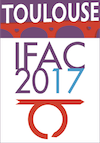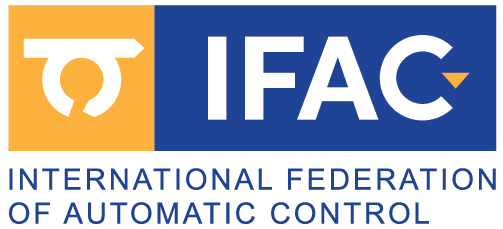Latest 8 submitted open invited tracks about Fractional Order Systems; Green Technologies; Large-Scale Networked Systems; Iterative and Repetitive Control; Knowledge Management; Non-uniform Time Domain; Control in Medicine.
Fractional Order Systems Theory and Applications
Green Technologies for a cleaner production
Analysis and Control of Large-Scale Complex Networked Systems
Iterative Learning Control and Repetitive Control: Theoretical Advances and Emerging Applications
Knowledge Management Applications for control & automation
Stability, control and observation on non-uniform time domain
Control of Physiological Systems in Medicine: Models, Identification and Clinical Application
Control and Imaging for Devices and Systems in Medicine: Models, Identification and Clinical Application
Details follow.
Title: Fractional Order Systems Theory and Applications
Track proposed by: Yong Wang, Dingyu Xue, Donglian Qi, Junguo Lu, Yan Li
Abstract: Fractional order calculus is the natural generalization of classical integer order calculus. By the aid of fractional order calculus tools for modelling and control of dynamic systems, we can be “more optimal” as already documented in the literature. An interesting remark is that, more and more “anomalous” phenomena have been reported, even complained, under the framework of traditional integer order calculus, but in applied fractional order calculus community, it is now more widely accepted that the “anomalous” is normal in nature. Nonetheless, so many issues still need to be taken into a deeper consideration, such as, the physical meaning, initial value problem, and infinite energy storage. We believe, beneficial uses of this versatile mathematical tool of fractional order calculus in practical applications are possible and even indispensable, and fractional order calculus may become an enabler for new science discoveries. As the only fractional order session in IFAC world congress, this track, with its revealing content and up-to-date developments, joins the utmost proof for this distinctive tendency of adoption of fractional order calculus. It is our sincere hope that this track will become a milestone of a significant trend in the future development of classical and modern control theory.
Code for submitting contributions: 6368j
Full description: PDF
Title: Green Technologies for a cleaner production
Track proposed by: Eric Rondeau, Jean-Philippe Georges, Frédérique Mayer
Abstract: The future world challenges include impact of technological development and new emerging technologies on environment and require an enormous effort to efficiently address air, water, food and energy challenges. The smart 2020 report written by the international climate group recommends to intensively deploy Information and Communication Technologies (ICT) both for enhancing the monitoring of environment and human activities (industry, building, transport, etc.) and for istributed smart ICT systems for enabling to mitigate the pollution, the waste, food quality and supply, energy constraints, etc. Moreover, the traditional methodologies in distributed system engineering have to be adapted and reviewed for minimizing the ICT footprint on the environment in terms of carbon emission, radio wave propagation, waste, technological pollution, energy efficiency, resource reuse, etc. Thus, ICT system engineering has to be globally rethought in the context of new business paradigm as the circular economy. The major effort of Engineering focuses then on the resource efficiency. The objective of Open Invited Track “Green Technologies for a cleaner production” is to share original research, industrial and education contributions on these related topics:
- Green Technologies : Green software, Green networking, Green storage, Green ICT architecture (Internet/web of things, big data, etc.).
- Greening by ICT / Cleaner production: Smart industries, Smart cities, Smart building, Smart grid, renewable energy, Smart logistic, Environmental management.
- Eco-design: Systemic approach, Life cycle management, Circular economy, Obsolescence, Biomimicry, Green metrics & evaluation, Standardization.
- Sustainable Society: Service economy, Digital divide, Open data, ICT & Ethics, Education.
Code for submitting contributions: 12v19
Full description: PDF
Title: Analysis and Control of Large-Scale Complex Networked Systems
Track proposed by: Xiaofan Wang, Wei Ren, Mario di Bernardo
Abstract: In the past two decades, there have been more and more research interests in the analysis and control of large-scale complex networked systems, with application to communication networks, power grids, transportation networks, biological networks, social networks and so on. The aim of this track is to bring together different communities working on different aspects of complex networked systems. The track will discuss some fundamental issues on control of complex networks, including controllability and observability of complex networks, mathematical and algorithmic tools for analysis and design of large-scale networked systems, and potential applications to real-world systems.
Code for submitting contributions: g48g3
Full description: PDF
Title: Iterative Learning Control and Repetitive Control: Theoretical Advances and Emerging Applications
Track proposed by: Tom Oomen, Kira Barton, Sandipan Mishra, Bing Chu
Abstract: Iterative Learning Control (ILC) and Repetitive Control enable improved tracking performance on repeated trajectories by updating the control on each iteration using measured signals from the previous task. Several frameworks have been developed, and these can be applied to a myriad of engineering systems that operate repeatedly on the same trajectory, especially in manufacturing, robotics, data storage systems, process control, etc. The aim of this session is to bring together researchers working on different frameworks, addressing theoretical advances and/or new and nontraditional application areas.
Code for submitting contributions: n985a
Full description: PDF
Title: Knowledge Management Applications for control & automation
Track proposed by: Davy Monticolo, Laurent Geneste, Aline De Abreu, Pedro Felipe De Abreu, Frédérique Mayer
Abstract: Nowadays, the research issues in knowledge management for industrial organizations are based on the development of new approaches, new technologies and modes of interaction in the engineering project teams. In a highly Web environment, these teams have to use and invent new solutions to improve knowledge transfer, storage and retrieval. The technologies and methods continue to get more and more diverse. At the same time, the types of online communities with high levels of interaction become more and more multi-dimensional. To optimize organizational performance and further promote knowledge innovation and knowledge management in industrial organizations, new and expanded strategies for sharing knowledge within and between knowledge communities are required. This track offers the opportunity to exchange ideas about new knowledge management applications. The track will allow sharing experiences and interacting between researchers and engineers.
Code for submitting contributions: 62y2r
Full description: PDF
Title: Stability, control and observation on non-uniform time domain
Track proposed by: Mohamed Djemai, Michael Defoort
Abstract: The main objective of this invited open track is to exhibit recent developments in methodologies, techniques, and applications for systems evolving on non-uniform time domain including issues such as integral inequalities on time scales, stability analysis, control and observation of nonlinear and/or switched systems on non-uniform time domains, etc. Both theoretical and application results are sought for. A second objective of the session is to provide a platform for academic and industrial communities to exchange their latest results and to identify main issues and challenges for future investigation on time scale theory for dynamical systems.
Code for submitting contributions: x3114
Full description: PDF
Title: Control of Physiological Systems in Medicine: Models, Identification and Clinical Application
Track proposed by: Thomas Desaive, Steffen Leonhardt, Neil D. Evans, Christopher Pretty, Michael Chappell, Paul D Docherty, Teresa Mendonça, J. Geoffrey Chase
Abstract: This session focuses on the convergence of technological advance and aging population demographics as they impact clinical medical practice. Aging populations have put increased stress on medical resources with a greater demand for critical care and other acute care treatment starting to exceed availability in many first world nations. At the same time, the past 20 years have seen a tremendous growth in the application of technology to clinical practice, as well as in the computing power available in every-day and medical devices.
However, despite these changes, the practice of medicine, particularly in the diagnostic and therapy selection parts of practice have seen little change in the past 30 years. At the same time clinical practice is under increasing strain due to limited resources. Hence there is significant opportunity to augment and (partially) automate diagnosis and therapy selection using patient specific modeling. This opportunity is particularly relevant in high cost acute care wards, such as the intensive care unit (ICU), where significant clinical decisions must be made rapidly by staff under increasing demand for their time. However applications can spread across a variety of clinical wards and outpatient settings, as well as across a variety of biological systems not restricted just to humans.
Hence, there has been some recent growth in the use of models to help test and evaluate new hypotheses in the physiological development of diseases. This trend has been most notable in the analysis of drug therapy pharmacokinetics and in the study of metabolic disorders. This session therefore examines the application of models to medical practice, in both research and clinical practice, through all critical modeling steps from model derivation to patient specific parameter identification to the clinical validation.
The goal of research in this area is to unleash the potential of patient specific physiological or systems biology models to improve care. Given the growing potential for the clinical use of such model-based methods, it is a good time to examine them in greater detail.
Code for submitting contributions: 5hy1a
Full description: PDF
Title: Control and Imaging for Devices and Systems in Medicine: Models, Identification and Clinical Application
Track proposed by: Thomas Schauer, Marcos de Sales Guerra Tsuzuki, Balazs Benyo, Geoffrey W. Rodgers, Knut Moeller, Christopher Pretty, Steffen Leonhardt, Berno Misgeld, J. Geoffrey Chase
Abstract: This session focuses on the convergence of technological advance and aging population demographics as they impact clinical medical practice. Aging populations have put increased stress on medical resources with a greater demand for critical care and other acute care treatment starting to exceed availability in many first world nations. At the same time, the past 20 years have seen a tremendous growth in the application of technology to clinical practice, as well as in the computing power available in every-day and medical devices.
However, despite these changes, the practice of medicine, particularly in the diagnostic and therapy selection parts of practice have seen little change in the past 30 years. At the same time clinical practice is under increasing strain due to limited resources. Hence there is significant opportunity to augment and (partially) automate diagnosis and therapy selection using patient specific modeling. This opportunity is particularly relevant in high cost acute care wards, such as the intensive care unit (ICU), where significant clinical decisions must be made rapidly by staff under increasing demand for their time. However applications can spread across a variety of clinical wards and outpatient settings, as well as across a variety of biological systems not restricted just to humans.
Hence, there has been some recent growth in the use of models to help test and evaluate new hypotheses in the physiological development of diseases. This trend has been most notable in the analysis of drug therapy pharmacokinetics and in the study of metabolic disorders. This session therefore examines the application of models to medical practice, in both research and clinical practice, through all critical modeling steps from model derivation to patient specific parameter identification to the clinical validation with a focus on the medical devices and systems used to provide that care.
Given the growing potential for the clinical use of such model-based methods, it is a good time to examine them in greater detail. This session thus takes a very clinical applications oriented approach, including examining problems that arise from different types of clinical data, as well as the impact on outcomes.
Code for submitting contributions: 32y33
Full description: PDF
More about submitted open invited tracks at www.ifac2017.org/OIT
Precisions about Invited Sessions and Open Invited Tracks at www.ifac2017.org/invited






























